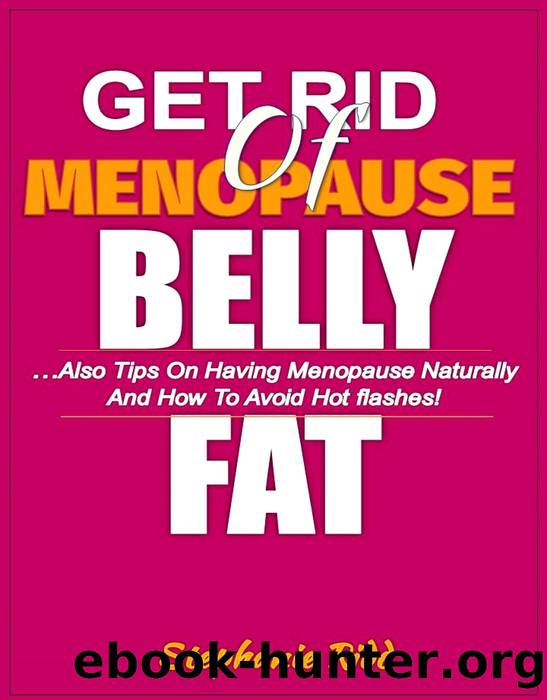Get Rid of Menopause Belly Fat by Stephanie Ridd

Author:Stephanie Ridd
Language: eng
Format: epub
Tags: menopause belly fat diet, menopause belly fat cure, menopause belly, menopause belly fat, menopause belly exercises, menopause belly bloat, menopause symptoms, symptoms of menopause, signs of menopause, menopause age, hormone replacement therapy, hot flashes, perimenopause, perimenopause symptoms, night sweats
Publisher: Eljays-epublishing
Published: 2015-10-07T00:00:00+00:00
Signs and Symptoms of Menopause
Well, as we already know, "Menopause" is a term commonly used to describe a period of physical and physiological changes that a woman experiences marking the end of her reproductive life.
We know now that typically, a woman will begin experiencing menopause around her mid-40s although it is not unheard of for the changes to begin in the late 30s, early 40s and late 40s. The period is usually characterized by physical and emotional symptoms caused by hormonal imbalance and will last for about two years before a gradual decline.
In this regard I have compiled a list of the common menopause symptoms. It is important to remember that the symptoms vary considerably from one person to the next and that the counsel of a licensed medical practitioner should be sought for a conclusive analysis.
1. Hot Flushes and Night Sweats
This happens to be the most common and easily recognizable symptom of menopause, it is estimated that over 60% of all women experience it. The experience is said to range from delicate flushes of increased body heat to moments of feeling as though one is engulfed in flames.
Night sweats are basically hot flushes at night. They can cause sleepless nights and a reduction in the general reduction in the quality of life. These flushes are caused by the gradual reduction of estrogen in the body thereby upsetting the temperature regulation part of the brain.
2. An irregular menstrual cycle
Most women have already experienced this symptom during their reproductive life. It can range from irregular periods to heavy, prolonged or painful periods and is primarily caused by hormonal imbalances in the body such as reduction in progesterone.
Some women have had their periods stop for some months only to return with a vengeance. If you experience extreme discomfort it is recommended that you consult a doctor as soon as possible.
3. Mood Swings
Another experience most women can identify with is the irritability, anxiety and general change of moods during their menstrual cycle. During menopause the constantly decreasing levels of hormones affect the way the brain functions and thus low moods will be experienced.
To make matters worse menopause is usually accompanied by a phase of life where children are leaving the home thereby increasing the chances of depression. It is advisable that one finds support during this period.
4. Weight gain, thinning, hair loss and joint pain
As a woman approaches the end of her reproductive life she usually has a reduction in physical activity. This will ultimately lead to either weight gain or weight loss depending on the personâs metabolism and gradual hair loss and thinning.
The loss of hair is a consequence of lower estrogen levels which cause a deficiency in the nutrients required by hair follicles to sustain growth. Joint pain and muscle aches will be experienced by over 50% in their menopausal period but can be countered by change in diet to replace the deficiencies the body is experiencing. Consult a nutritionist as they will chart a way forward for your new nutritional needs.
Download
This site does not store any files on its server. We only index and link to content provided by other sites. Please contact the content providers to delete copyright contents if any and email us, we'll remove relevant links or contents immediately.
| Breast Cancer | Candida |
| Chronic Fatigue Syndrome & Fibromyalgia | Endometriosis |
| General | Lupus |
| Menopause | Menstruation |
| Postpartum Depression | Pregnancy & Childbirth |
| Sexual Health |
Name Book, The: Over 10,000 Names--Their Meanings, Origins, and Spiritual Significance by Astoria Dorothy(2496)
Tone Your Tummy Type by Denise Austin(2372)
The Women's Health Fitness Fix by Jen Ator(1928)
The Expectant Father by Armin A. Brott & Jennifer Ash(1898)
The Coregasm Workout by Debby Herbenick(1824)
The Ultimate Guide to Anal Sex for Women by Tristan Taormino(1758)
Expecting Better by Emily Oster(1712)
She-ology by Sherry A. Ross MD(1701)
The Hite Report on Shere Hite by Shere Hite(1666)
8 Steps to Reverse Your PCOS by Fiona McCulloch(1598)
Woman: An Intimate Geography by Natalie Angier(1586)
Birth by Tina Cassidy(1573)
Women & the Weight Loss Tamasha by Diwekar Rujuta(1528)
The Female Brain by M.D. Louann Brizendine(1518)
101 Get-Lean Workouts and Strategies by Muscle & Fitness(1509)
50 Ways to Soothe Yourself Without Food by Susan Albers(1403)
The Big Booty Blueprint: Your Guide To A Bigger Butt In Less Than 12 Weeks by Bella Rahbek & Brandon Carter(1369)
Unleash the Power of the Female Brain: Supercharging Yours for Better Health, Energy, Mood, Focus, and Sex by Daniel G. Amen M.D(1289)
The overachievers by Robbins Alexandra(1287)
